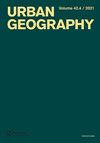Navigating constraints, finding freedom: exploring asylum seekers’ access to urban arrival infrastructures
IF 2.9
2区 经济学
Q1 GEOGRAPHY
引用次数: 0
Abstract
This paper explores asylum seekers’ experiences of urban arrival infrastructures, illustrating how these provide asylum seekers with opportunities for familiarization with the reception location and its inhabitants. Drawing on two qualitative case studies in Augsburg, Germany, three different subsets of arrival infrastructures emerged as relevant to familiarization; infrastructures for information, for language learning and for social connection. The analysis shows how asylum seekers are differentially positioned towards accessing informational, language-learning and social infrastructures due the intersection of spatial, institutional and personal constraints. Public and semi-public spaces proved to be indispensable to asylum seekers’ informational, language learning and social infrastructures. The paper concludes by highlighting the ambiguity and political nature of urban arrival infrastructures: While state-provided, formal infrastructures often undermined the process of familiarization and contributed to asylum seekers’ differential access to opportunities and resources, informal, citizen-provided infrastructures were crucial in supporting asylum seekers’ needs during the periods of uncertainty.驾驭约束,寻找自由:探索寻求庇护者进入城市抵达基础设施的途径
本文探讨了寻求庇护者对城市抵达基础设施的体验,说明了这些设施如何为寻求庇护者提供熟悉接待地点及其居民的机会。根据德国奥格斯堡的两个定性案例研究,出现了与熟悉相关的三个不同的抵达基础设施子集;信息、语言学习和社会联系的基础设施。分析表明,由于空间、体制和个人的相互制约,寻求庇护者在获取信息、语言学习和社会基础设施方面的地位存在差异。事实证明,公共和半公共空间对于寻求庇护者的信息、语言学习和社会基础设施是不可或缺的。论文最后强调了城市抵达基础设施的模糊性和政治性:虽然国家提供的正式基础设施往往破坏了熟悉的过程,并导致寻求庇护者在获得机会和资源方面的差异,但在不确定时期,公民提供的非正式基础设施对于支持寻求庇护者的需求至关重要。
本文章由计算机程序翻译,如有差异,请以英文原文为准。
求助全文
约1分钟内获得全文
求助全文
来源期刊

Urban Geography
Multiple-
CiteScore
7.60
自引率
10.50%
发文量
104
期刊介绍:
Editorial Policy. Urban Geography publishes research articles covering a wide range of topics and approaches of interest to urban geographers. Articles should be relevant, timely, and well-designed, should have broad significance, and should demonstrate originality.
 求助内容:
求助内容: 应助结果提醒方式:
应助结果提醒方式:


